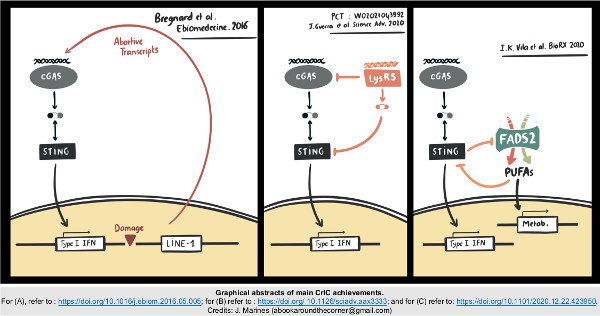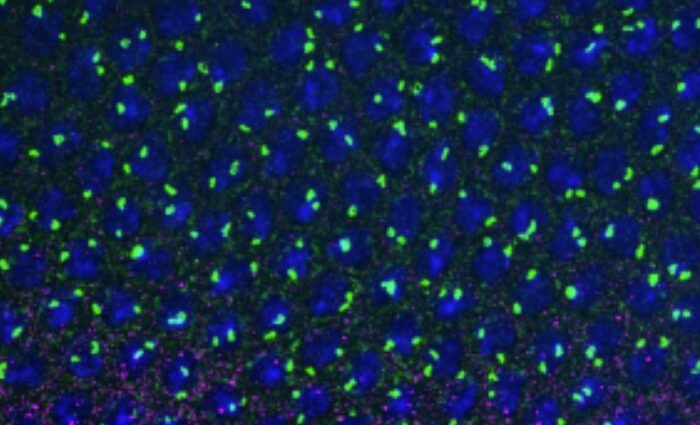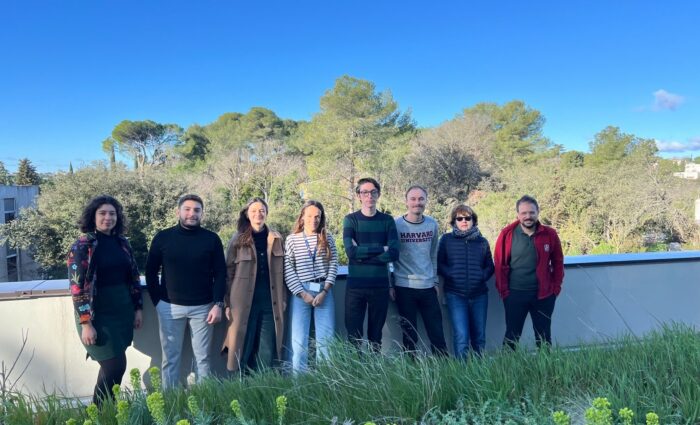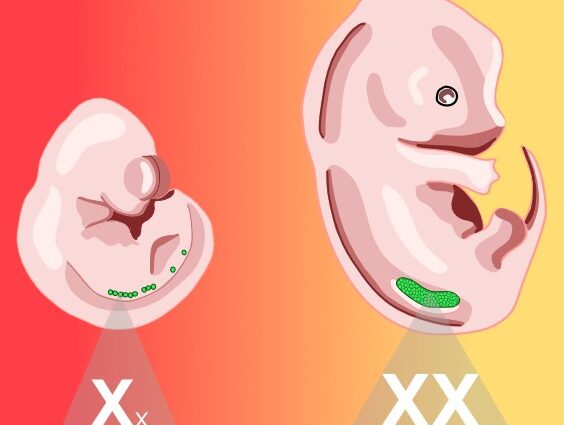Molecular basis of the cross-talk between chronic inflammation and cancer.* ERG Starting Grant (CrIC; GA #637763) ~ 1.5 M€ ~ 2015-2021
→ ERC Proof of Concept 2019: Decreasing Pancreatic Adenocarcinoma-related Inflammation using small molecule inhibitors of STING. ** (DIM-CrIC ; GA #893772) ~150 k€
Synopsis:
The CrIC project aimed at identifying the molecular mechanisms at play in the onset and maintenance of tumor promoting inflammation. Particular interest was brought to inflammation associated with the accumulation of cytosolic nucleic acid species. The latter include ssDNA, dsDNA and RNA:DNA hybrids, that can derive from pathogen infections (viruses, bacteria), but also originate from mitochondria or the nucleus. In recent years, several pathways have been identified as involved in the detection of aberrant cytosolic nucleic acid species. In particular the cyclic GMP-AMP (cGAMP) synthase (cGAS) receptor has been established as one of the key detectors of these moieties, and as a potent inducer of type I Interferon responses. Upon detection of cytosolic nucleic acids, cGAS produces the cGAMP second messenger that can interact with the Stimulator of interferon genes (STING) adaptor protein, leading to the assembly of a STING signalosome that orchestrates type I Interferon responses.

Completion of the objectives set within the proposal has led to:
– insight into ways in which inflammation is initiated within tumor cells. Indeed, we have shown that mobile genetic elements are a source of pathological nucleic acids that are recognized by cGAS to promote chronic type I Interferon production. Indeed, absence of efficient DNA repair through the Fanconi Anemia DNA repair pathway and chemotherapy regimens both lead to de-repression of mobile genetic elements, in particular of the LINE-1 family, that trigger type I Interferon responses (Bregnard et al, EBioMedicine, 2016).
– the identification the Lysyl-tRNA synthetase (LysRS) as a negative regulator of cGAS-STING activation. We have shown that LysRS interacts with RNA:DNA hybrids, preventing their detection by cGAS, but also produces a second messenger (diadenosine tetraphosphate – Ap4A) that interacts with STING, inhibiting the interaction of STING with cGAMP. This control of the cGAS-STING axis, is central to determining the amplitude and duration of type I Interferon responses (Guerra et al, Science Adv; Patent : PCT : WO2021043992). The impact of the identified pathway on tumorigenesis is currently under characterization in the laboratory.
– We have shown that the activation of the cGAS-STING pathway is also controlled by DNA repair proteins, opening novel perspectives in our understanding of how DNA repair and inflammatory pathways contribute to pervasive cancer-associated inflammation (Taffoni et al, Frontiers in Immunology, in press; Taffoni, Marines et al, manuscript in preparation).
– Finally, we demonstrate that STING, independently of its role in inflammatory responses, controls metabolic homeostasis. In particular, we show that STING regulates polyunsaturated fatty acid (PUFAs) metabolism directly, through interacting with the Fatty acid desaturase 2 (Fads2) enzyme and inhibiting its activity. Furthermore, we show that PUFAs exert a negative control on STING activity (Vila et al, bioRXiv).
Work stemming from CrIC has also allowed the team to:
– benefit from an ERC Proof of Concept grant
– to establish an interdisciplinary international research network with leaders in their respective fields (www.frontinov.cnrs.fr)
Publications:
CrIC has led to the following main publications:
1.Taffoni C, Marines J, Chamma H, Guha S, Saccas M, Bouzid A, Valadao AC, Maghe C, Jardine J, Park MK, Polak K, De Martino M, Vanpouille-Box C, Del Rio M, Gongora C, Gavard J, Bidère N, Song MS, Pineau D, Hugnot JP, Kissa K, Fontenille L, Blanchet FP, Vila IK, Laguette N. 2023. DNA damage repair kinase DNA-PK and cGAS synergize to induce cancer-related inflammation in glioblastoma. EMBO J. doi: 10.15252/embj.2022111961.
2.Chamma H, Guha S, Laguette N, Vila IK. 2022. Protocol to induce and assess cGAS-STING pathway activation in vitro. STAR Protoc. doi: 10.1016/j.xpro.2022.101384.
3.Chamma H, Vila IK, Taffoni C, Turtoi A, Laguette N. 2022. Activation of STING in the pancreatic tumor microenvironment: A novel therapeutic opportunity. Cancer Lett. doi: 10.1016/j.canlet.2022.215694.
4.Vila IK, Chamma H, Steer A, Saccas M, Taffoni C, Turtoi E, Reinert LS, Hussain S, Marines J, Jin L, Bonnefont X, Hubert M, Schwartz O, Paludan SR, Van Simaeys G, Doumont G, Sobhian B, Vlachakis D, Turtoi A, Laguette N. 2022. STING orchestrates the crosstalk between polyunsaturated fatty acid metabolism and inflammatory responses. Cell Metab. doi: 10.1016/j.cmet.2021.12.007.
5.Laguette N, Langevin C, Olagnier D, Torraca V, Vanpouille-Box C, Verrier ER. 2021 Editorial: Nucleic Acid-Associated Inflammation. Front Immunol. doi: 10.3389/fimmu.2021.791580.
6.Taffoni C, Steer A, Marines J, Chamma H, Vila IK and Laguette N. 2021. Nucleic acid immunity and DNA Damage Response: new friends and old foes. Frontiers in Immunology. https://doi.org/10.3389/fimmu.2021.660560
7.Vila IK, Fretaud M, Vlachakis D, Laguette N, Langevin C. 2020. Animal Models for the Study of Nucleic Acid Immunity: Novel Tools and New Perspectives. Journal of molecular biology. doi: 10.1016/j.jmb.2020.08.016
8.Guerra J, Valadao A-L, Vlachakis D, Polak K, Vila IK, Prabakaran T, Marriott AS, Kaczmarek R, Houel A, Auzemery B, Déjardin S, Boudinot P, Nawrot B, Jones NJ, Paludan SR, Kossida S, Langevin C, Laguette N. 2020. Lysyl-tRNA synthetase produces diadenosine tetraphosphate to curb STING-dependent inflammation. Science Adv. doi: 10.1126/sciadv.aax3333
9.Brégnard C, Déjardin S, Passalacqua F, Benkirane M, Laguette N. 2016. Upregulated LINE-1 activity in the Fanconi Anemia cancer susceptibility syndrome leads to spontaneous pro-inflammatory cytokine production. EBioMed. doi : 10.1016/j.ebiom.2016.05.005
Other achievements:
1.Creation of the FrontInov International Research Network: https://frontinov.cnrs.fr/
2.ERC-Proof-of Concept : Decreasing Pancreatic Adenocarcinoma-related Inflammation using small molecule inhibitors of STING (DIM-CrIC ; GA #893772)
3.Patent: STING inhibitors and their therapeutic uses. PCT: WO2021043992.
* This project has received funding from the European Research Council (ERC) under the European Union’s Horizon 2020 research and innovation program (grant agreement No [637763]) and has allowed the awarding of an **ERC Proof of Concept grant in 2019 (grant agreement No [893772]).







